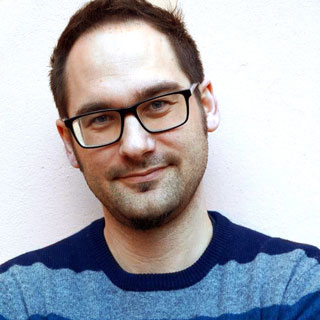Gal Kirn is an Open Topic Fellow at the TU Dresden (Slavonic and Cultural Studies). In the past he as worked, amongst others, at the Berlin Institute for Cultural Inquiry (“Parallax View of Memory Politics in the Post-Yugoslav Context”), at Humboldt University in Berlin (“On the early Soviet Avant-Garde”), where he had been awarded with a postdoctoral fellowship from the Alexander-von-Humboldt Foundation, and at Stuttgart, where he had received a fellowship at the Akademie Schloss Solitude for the project “Thinking the Monument to Sub/Urban Riots” (together with Niloufar Tajeri). He is currently finishing his manuscript on The Partisan Counter Archive. Originally from Slovenia, he had started his studies in Ljubljana, where he received in 2005 his Diploma in Political Theory (Faculty of Social Sciences). Kirn then continued his studies at the University of Nova Gorica, where he received in 2012 “summa cum laude” for his thesis “Conceptualising Politics and Reproduction in the Work of Louis Althusser: Case of Socialist Yugoslavia”
His research interest span from (post)Marxist theory, critique of ideology to politics of aesthetics, film theory and memory studies. In his most recent works he focused on politics and culture of partisan memory in the (post)Yugoslav context, parameters that are also visible in his current project “Apparatus of Cinema-Train in the early Soviet Context”.
Publications
Books and edited volumes
Forthcoming in 2019: Partisan Ruptures: Self-Management, Market Reform and the Spectre of Socialist Yugoslavia, Pluto Press: London.
2017: Beyond Neoliberalism? Social Analysis after 1989, edited with Marian Burchardt, Palgrave Macmillan: London.
2016: Yugoslav Partisan Art, edited with Jernej Habjan, Slavica tergestina – European Slavic Studies Journal, Volume 17.
2015: Partizanski prelomi in protislovja tržnega socializma v Jugoslaviji [Partisan Ruptures and Contradictions of Market Socialism in Yugoslavia], Sophia: Ljubljana.
2013: Encountering Althusser, edited with Sara Farris, Katja Diefenbach and Peter Thomas, Bloomsbury: New York.
2012 a: Conceptualisation of Politics and Reproduction in the Work of Louis Althusser, Doctoral Thesis, University of Nova Gorica: Nova Gorica.
2012 b: Surfing the Black Wave. Transgressive Moments in Yugoslav Cinema, edited with Dubravka Sekulic and Žiga Testen, Jan van Eyck Academy: Maastricht.
Articles
2018: “Awakening Lazarus: Forgotten Figures – Masses and Surplus?”, in Stasis Journal, St. Petersburg
2017: “Eisenstein, Vertov, Medvedkin: revolutionary cinefication and communist subjectivity”, in Kinokultura, issue 58: http://www.kinokultura.com/2017/58-kirn.shtml
2016: “From Critique of Groys’ Reading to Return of the Avant-garde”, in Aleksandra Sekulic, Branko Dimitrijevic (eds.) En- Garde, 20/21, HBS: Belgrade, pp. 21-41.
2015: “Between Socialist Modernisation and Cinematic Modernism: The Revolutionary Aesthetics of Alexander Medvedkin’s Cinema-Train”, in Ewa Mazierska, Lars Kristensen (eds.), Marxism and Film Activism, New York: Berghahn Books, pp. 29–57.
2014a: “Die politische Ästhetik des Neuen jugoslawischen Films”, in Christine Gölz, Alfrun Kliems (eds.), Spielplätze der Verweigerung. Gegenkulturen im östlichen Europa nach 1956, Boehlau: Köln–Weimar–Wien: pp. 84-106.
2014b: “Memorial Multistability on Partisan Struggle: From post-Yugoslav Nationalist Reconciliation Back to Partisan Poetry”, in Christoph Holzhey (ed.), Multistable Figures: On the Critical Potential of Ir/Reversible Aspect Seeing, Turia+Kant: Berlin/Wien, pp.163-191.
2014c: “A Few Notes on the History of Social Ownership in the Spheres of Culture and Film in Socialist Yugoslavia from the 1960s to the 1970s”, in Etnološka tribina 44.37, pp. 109-123.
© photo: Claudia Peppel.

